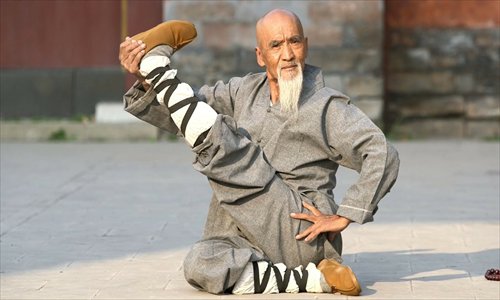
 |
| Master Li Liankui (Global Times/Courtesy of Cheng Cheng) |
Searching for kung fu
"There have been countless foreign documentaries about Chinese kung fu since the 1950s when their parallel films emerged," said Guan, "but most of them come from foreigners' curiosity about kung fu, presenting what they are and how to practice them, lacking further exploration about the culture behind them," said Guan.
From the sample video of the documentary's first episode, "Searching for Kung Fu," audiences can see an American host who has practiced kung fu for 20 years. He travels to different places searching for heirs of different kung fu factions. As the host personally experiences kung fu with the heirs, audiences get a deeper understanding.
Guan explained there will be 26 episodes broadcast per year, and they planned to focus first on North America with the Discovery channel as the program's distributor.
Concentrate on culture
This year, the documentary A Bite of China became an overnight success. But what attracts audiences is not just the mouth-watering food: it's the local customs and traditions behind them.
The hit show's concept helped inspire the documentary Kung Fu. "The second part 'Culture Behind Kung Fu' is what we want to stress most," said Guan.
In recent years, rough and slipshod kung fu performances, which lack necessary cultural and historic interpretations in films, have disappointed domestic audiences and led to a decline in the kung fu film genre. However, the opposite is true in foreign countries, according to Guan. "Recent years have seen more and more foreigners coming to China to learn kung fu at the Shaolin Temple (in Henan Province) and Wudang Mountain (in Hubei Province), and they stay there for a long time."
Guan told the Global Times that when he talked to Mark Harris, the latter said the reason he wants to do such a documentary is that he wants to find out why kung fu was highly emphasized and respected when China was actually not strong (in the early and mid-20th century), but now as China is becoming strong, kung fu and its culture seem to have fallen into oblivion.
"Psychologically we believe there are three levels of demand when a person wants to learn and practice kung fu," said Guan, "The first level is out of basic human instinct to dominate others; the second is the belief in a chivalrous spirit." Both levels underline the practitioner's desire to make himself physically strong.
"As to the third level and also the highest, it is more philosophical. It's a human's self-perception. He wants to overcome his own weaknesses and be master of himself through practicing kung fu," he added.
"China is undergoing a development period when most people are busy pursuing material instead of spiritual saturation, but meanwhile there are some ... that emphasize spiritual development; they hope to draw inspiration through practicing kung fu and learning its culture. So, what we are doing is to discover and reveal the cultural significance behind martial arts," Guan explained.

















![]()
